Enneagram 4 vs 5: Which Are You?
Not sure if you’re an Enneagram 4 or an Enneagram 5? Then you’re in the right place! As an Enneagram coach I’ve encountered this issue with clients time and time again. Both types look similar at first glance! They’re both introspective, individualistic, and withdrawn. But while they might appear similar, their deeper motivations and ways of relating to the world are wildly different.
Let’s dive into the key differences to help you decide which type resonates with you more.

Not sure what your Enneagram type is? Take our free questionnaire here
4 vs 5: Which Fits You Best?
First, let’s take a look at their Centers of Intelligence. Each Enneagram type belongs to one of three centers (Head, Body, Heart). When we know which center they reside in we can better grasp their motivations!
Enneagram 4 belongs to the Heart Triad.
Fours are emotionally driven and focus on identity, personal significance, and self-expression. Passionate and intense, they direct their attention inwards to find out what drives them, what stirs their soul, and who they are on a core level. Their core struggle is with shame—the fear that they lack something essential that others possess. As a Four myself I can attest to this. We tend to feel like we’re outsiders and that others somehow are better at “fitting in” with the world than we are.
To compensate, Fours steer their focus towards being unique and authentic. After all, if no one is going to “get” them no matter how hard they try, why bother trying to pretend anymore? They feel their emotions deeply and often create meaning out of their personal experiences, which can manifest in their art, relationships, writing, and even career choices. Fours are on a quest to find and express their individuality, often worrying that they are fundamentally flawed or different from others.
Enneagram 5 belongs to the Head Triad.
Fives are mentally driven and focus on knowledge, understanding, and self-sufficiency. Their core struggle is with fear—specifically, the fear of being overwhelmed by the demands and emotions of others. If someone barges in on a Five, I can guarantee the Five’s heart rate goes through the roof, not because they were caught doing anything bad, but because their quiet inner sanctum was unceremoniously destroyed.
To cope with this, Fives withdraw into their minds, gathering information and conserving their energy. They strive for independence and privacy, often believing that they need to protect their inner resources by maintaining distance from others. While Fours delve into emotions, Fives retreat into intellect and observation.
Motivations: What Drives Each Type?
At their core, Fours are motivated by a desire to discover and express their true identity. They want to be seen and understood for who they truly are and may feel a constant sense of longing for something they can’t quite grasp—a deeper connection, a lost ideal, or an elusive sense of fulfillment. They may find themselves dreaming of an ideal partner who will finally see and appreciate them for who they really are. Or they may write poems or music that reflect an inner yearning to be understood. While some people mock this tendency, it typically comes from a childhood where they felt misunderstood, out of place, or even chastized for who they were.
At their core, Fives are motivated by a need to feel competent, capable, and in control of their environment. They fear being exhausted by others’ emotional or physical needs, so they retreat into their minds, seeking security through knowledge and self-sufficiency. Fives often believe that if they gather enough information and avoid emotional entanglements, they can protect themselves from the chaos of the outside world.
Emotional Expression vs. Emotional Detachment
Fours are highly attuned to their emotions and often feel them in deep, nuanced ways. They can experience emotional highs and lows and may seek out beauty or meaning in their feelings. Aesthetic experiences captivate them because they unlock an inner emotion that can be explored. A luminous, starry night might transport them to feelings of oneness with the universe, or a sense of smallness and insignificance. Every experience, good or bad, unlocks a plethora of rich emotions that the Four feels driven to explore. Fours tend to seek out relationships where they can be emotionally open and authentic. They are sensitive to abandonment and need validation that their emotions and individuality are understood and appreciated.
Fives, on the other hand, tend to detach from their emotions, preferring to analyze rather than feel. They protect themselves from emotional overwhelm by keeping their feelings private and under control. While Fours want the chance to express their feelings openly, Fives are more likely to keep theirs hidden, only revealing them to a select few who have earned their trust. Instead, they search for intellectual clarity and prefer to approach emotions with caution and restraint.
Example:
If a Four and a Five both go through a difficult breakup, the Four might deal with their heartbreak through art, writing, or deep conversations, craving catharsis by sharing their feelings. The Five, instead, might retreat into solitude, analyzing what went wrong, and trying to distance themselves from the emotional pain by focusing on practical solutions or distractions.
Relationships: Emotional Depth vs. Intellectual Boundaries
Fours crave deep, emotionally intense relationships. They are drawn to authenticity and may push for emotional honesty and vulnerability. The idea of being with someone who keeps things hidden or isn’t being authentic with them is a nightmare to a Four. At times, they may struggle with feelings of envy if they believe others have the depth of connection or experience they long for. Often, Fours oscillate between idealizing and devaluing their relationships, especially when they feel misunderstood.
Fives, in contrast, prioritize their independence in relationships. While they can form deep bonds, they tend to need more personal space and time to recharge than Fours do. Fives can feel overwhelmed by others’ emotional needs and may set firm boundaries to protect their energy. They approach relationships with a sense of caution and are careful about who they let into their inner world. Fives prefer intellectual companionship over emotional intensity and may struggle with vulnerability. I know a Five who has cut off several relationships because her partners seemed too needy, invasive, and overwhelming. After the relationships ended, she felt a sense of relief that she could retreat back into her cozy, introverted shell. At one point, a partner was trying to get really emotion
Strengths of Healthy Enneagram 4s:
- Emotional Depth
- Creativity
- Empathy and Sensitivity
- Authenticity and Self-Expression
- Ability to find meaning in even the hard parts of life
Strengths of Healthy Enneagram 5s:
- Intellectual Curiosity
- Independence and Self-Sufficiency
- Analytical Thinking
- Calm and Composure in Stressful Situations
- Ability to set boundaries and conserve energy
Final Thoughts: How to Tell Which Type Fits You
If you’re more in touch with your emotions, seeking deep, authentic connections, and feel a constant drive to express your individuality, you’re likely more of an Enneagram 4. You might be drawn to art, introspection, and meaning-making, with an underlying sense of longing for something that feels just out of reach.
If, on the other hand, you feel driven to gather knowledge, protect your energy, and maintain independence, you’re probably leaning more toward Enneagram 5. You value privacy and self-sufficiency, and you might feel more comfortable in your own mind, preferring intellectual pursuits over emotional intensity.
Which type resonates the most with you? Let me know in the comments!
Other Articles You Might Enjoy:
Enneagram 4: The Individualist


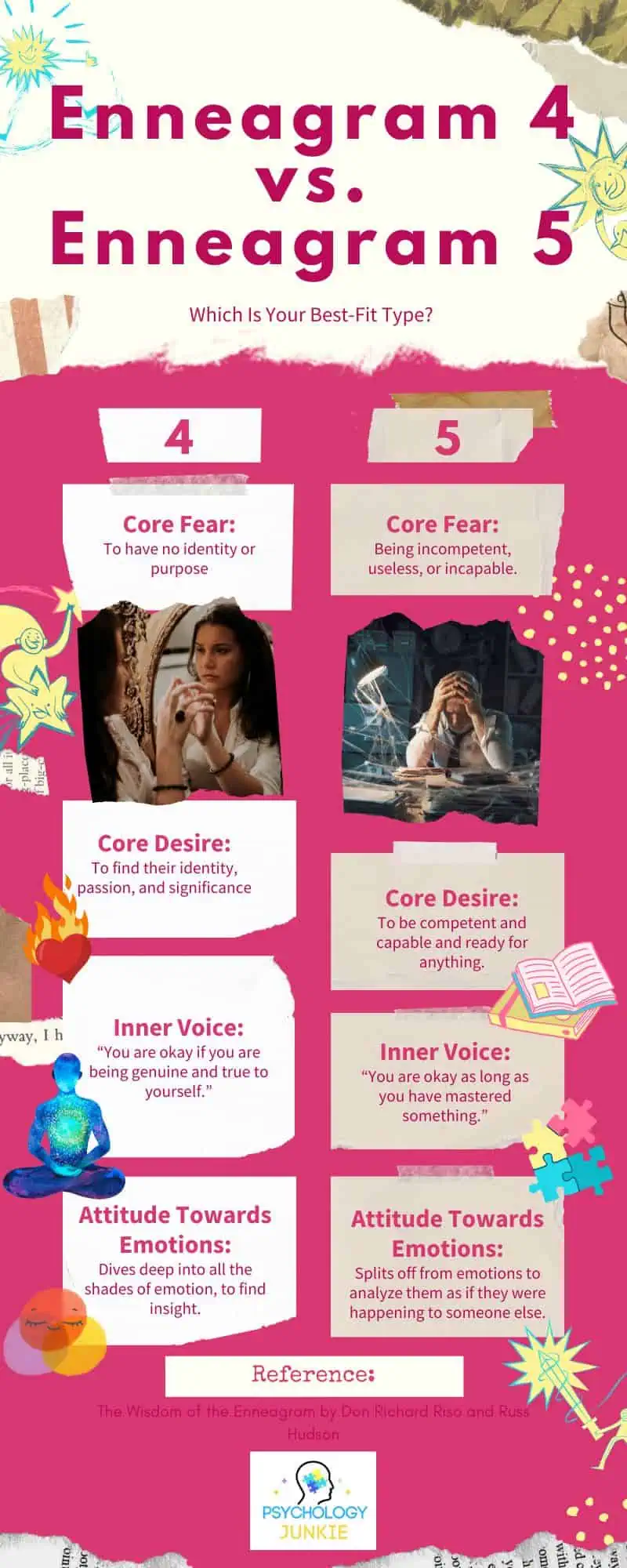




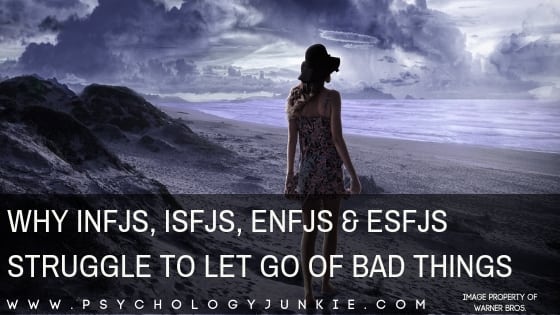
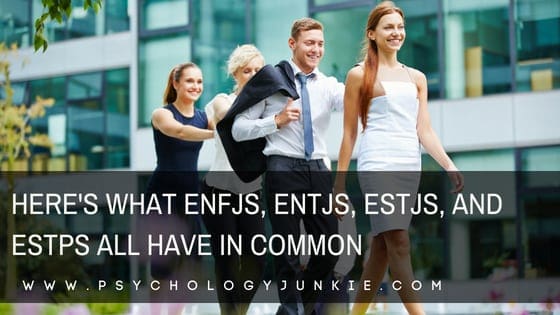

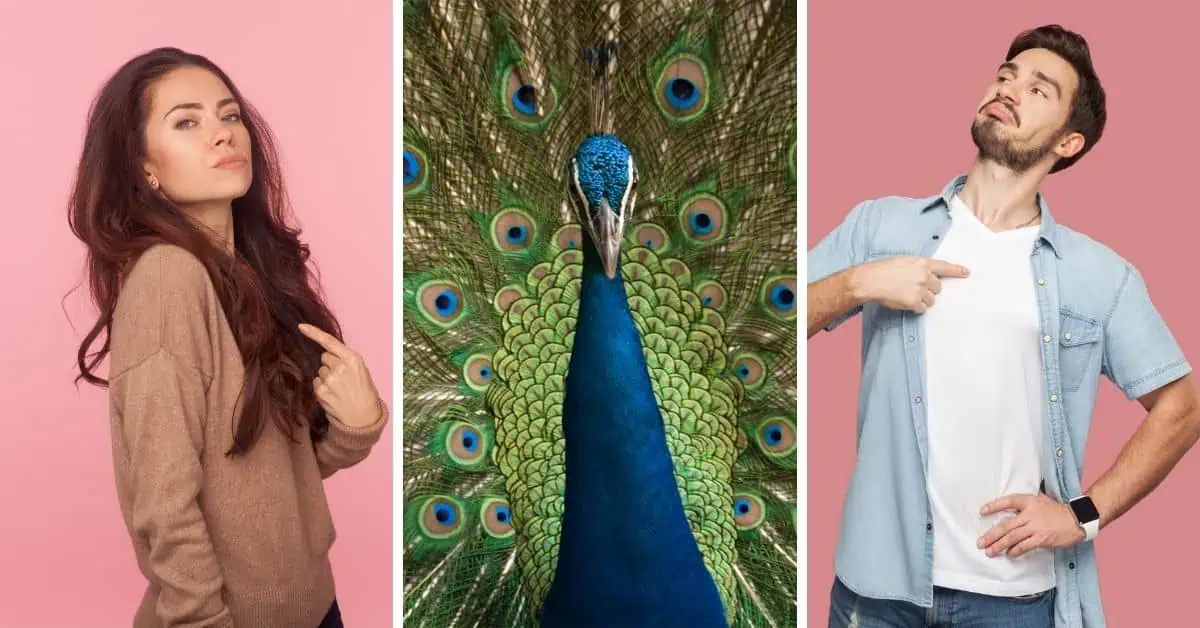
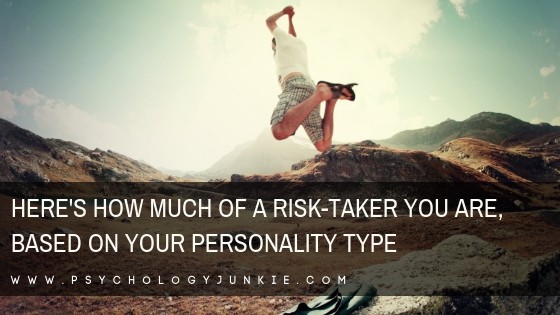
Hi Susan, I’ve been following you for years and wanted to thank you for all the insights you’ve provided. I’ve always struggled with being either an INFJ or INFP, and now whether I’m a 4 or 5. I think they go hand in hand as I’m a definite combination in both situations. I believe I’m naturally an INFP 4 but since emotions were taboo in my household, I had to learn to internalize them and mold myself into an INFJ 5 to survive. These feelings belonged to others and I was simply empathizing with them –they weren’t mine. It’s only been the past year that I’ve discovered the depths to which I’ve brainwashed myself (nearly 80 years) into being something I’m not–Feeler into Sensor. I feel like a double agent, a spy who’s come to appreciate both sides. Now that I’ve experienced this, I find it marvelously educational. Thanks again for all you do. I’ve watched you grow along with the rest of us over the years and marvel at your energy. Keep up the great work.
~doc
Thanks, insightful article.
With MBTI I always test INTJ without much ambiguity and I do identify with this result.
With Enneagram I normally test as 5, with with 4 and 6 wings. This article confirms my own perception that I am more 5 than 4. However, while there is some 6 in me, contrary to the tests I identify more easily with 1 than 6. I wonder why this is?
(Obviously we all have something of each of the types in us).
Hi. Are 5’s more likely to be on the Autism Spectrum? Which enneagram types are more likely to be NEURO-DIVERGENT, and in what ways?
I can relate to either one. Is there an Uber situation such as you’re about to be knighted but for what that would help a person decide?